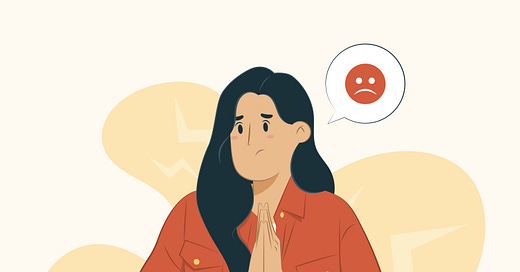It's time to stop saying sorry all the time
Apologizing when it's not your fault is an energy drain you can fix.
Coming soon: The HSP Revolution online community to support your journey of empowerment as a Highly Sensitive Person (HSP).
I’m sorry to bother you, but I have a question.
I’m sorry, do you have a minute to look at this?
I’m sorry I’m a bit late.
I’m sorry I didn’t get back to you sooner.
I’m sorry, this isn’t what I ordered.
I’m sorry I can’t make the meeting next week.
Sorry if this didn’t make sense and sounded jumbled.
I’m sorry could I just get past you please.
I’m sorry, I’ll do better next time.
Sorry, would it be okay to ask a question?
I’m sorry I got upset, I can be a bit emotional.
Do any of these sound familiar?
Of course, there are times when a heartfelt apology is appropriate, and it’s a sign of empathy, respect and emotional maturity to offer one.
However, many HSPs reflexively say “I’m sorry” out of habit.
Excessive apologizing can undermine your confidence, lower your mood, weaken your authority and harm your relationships, since continually saying sorry can be annoying to other people.
If you recognise yourself as a chronic over-apologizer, then the first step is to explore what’s going on at a deeper level. Like so many of the challenges we face as HSPs, it can help to take a look back into the past to see where a pattern began to form.
My grovelling past
It’s only relatively recently that I’ve begun to recognise my own tendency to over-apologize — which began when I was growing up and developed people pleasing tendencies in a bid to be seen as polite and likeable.
I remember one occasion in my teens when I was mortified to discover that I had a clash between a commitment to sing in a school concert and appear in a dance show at my performing arts school. I remember feeling so nervous going to tell the head of music at school that I’d made a huge mistake and that I needed to pull out of the concert. She went ballistic, shouting and telling me how I’d let her and everyone else down. I apologized and grovelled profusely to try and regain her approval because I couldn’t tolerate the feeling that I’d been a disappointment.
By the time I reached my late teens and early twenties, saying sorry had become an automatic response. I was forever saying sorry to get past someone on the bus; apologizing to colleagues at work; and saying sorry if I felt I had burdened a friend by pouring out my problems.
I remember when a friend took issue with something I had supposedly said and told me to apologize. I vividly remember feeling so upset, resentful and annoyed with myself afterwards for apologizing for something I hadn’t done.
And then there was the time on my first day of clinical psychology training that I was accused of smoking in my room by the caretaker. He pointed to a trace of dust and said it was cigarette ash — when I knew it was crumbled eyeliner that had fallen on the floor. He went on at me until I said I was sorry just to make him leave me alone.
Although I’m better these days, over-apologizing is not an easy habit to break and I can still find myself falling back into old patterns of saying sorry if I take longer than usual to respond to an email or text. If I can take a step back and examine the situation, I realise that there’s nothing to actually apologize for.
Why do HSPs over-apologize?
HSPs are particularly prone to being over-apologizers due to our tendency to feel like misfits and internalise a feeling that our particular ways of operating in the world are wrong because they often go against society’s grain.
So many of us have felt misunderstood; assumed we were too emotionally intense; or were labelled as “difficult” for asking awkward questions, that we fell into the habit of apologizing for fear of being rejected.
Our ability to feel other people’s emotions so deeply and empathise can make the habit worse. If we intuit that somebody is disappointed that we can’t make their leaving drinks next week even though they’ve left it to the last minute to invite us, for example, then before we know it, we’ll be saying sorry. For HSPs like me who dislike confrontation and conflict, we may quickly offer an apology for fear a disagreement could escalate.
Apologizing can also be a form of reassurance seeking and a way of soothing anxiety. For example, we might find ourselves in a situation where we feel overwhelmed by the amount of work we have to do, and say sorry to our boss to help ease our discomfort.
While we all want to be considerate and polite, over-apologizing is often rooted in a lack of self-worth.
Roots in childhood
If we were brought up in a home where we didn’t feel safe to fully express the depth of our emotions, or voice our true feelings, then we may have learned to shut parts of our authentic selves down to survive. We can end up feeling like we need to apologize for even existing, because no one was ever able to fully hold us and communicate to us that we were loved and acceptable just as we are.
If you were brought up in a strict home where you were frequently told off, you may have got into the habit of apologizing to try to win back your parents’ approval.
Conversely, your parents’ identity might have been so wrapped up in being the “good” parent that they sought validation from your achievements, your social life and your appearance. You may have learned to stuff down your own needs, thoughts and feelings to be the “good” daughter or son because you felt an unconscious pull to bolster your mother or father’s fragile self-esteem. As an HSP, you could sense your parents’ vulnerability, and learned how to behave in ways that would prevent them from having a meltdown — including by saying “sorry” when you didn’t mean it.
Perhaps your parents had low empathy and struggled to regulate their emotions — meaning they would project their disowned anxiety and anger onto you, and make out that you were the cause of their stress. That led you to feel like a burden and internalise a sense that you were responsible for their happiness. That left you terrified of doing something wrong or making a mistake, and you learned to keep a tight lid on your deepest thoughts and feelings.
You fear rejection.
You fear criticism.
You fear disapproval.
You go out your way to be accommodating.
You’ve become the peacemaker.
You’ve become the people-pleaser.
You’ve become the person who always says sorry.
Practical tips
The downside of being the sensitive individual who always says sorry and takes the blame is that you may be putting yourself at a disadvantage in situations with family, work and friends. HSPs who over-apologize can start to resent feeling taken for granted, and begin to beat themselves up for not being able to stand up for themselves. When we do actually need to say sorry for a genuine mistake, we’re so practiced at the habitual version that we may come across as insincere.
So how can we stop staying sorry so much?
Notice triggers — Observing the triggers, situations and people that cause you to over-apologize can help you to cultivate greater self-awareness. Do you say a habitual sorry when you’re feeling anxious, self-conscious or judged? We may notice that we say sorry not because of any actual wrong we’ve committed — but in response to disapproving looks or perceived judgments from others. The more we can catch ourselves starting a sentence with “I’m sorry,” the more we can choose again.
Question whether you really need to say sorry — Did you do something wrong? Take an objective look at the situation and ask yourself if you really do need to apologize. Has there been a misunderstanding where some clearer, more direct communication is needed? Who’s to say that you were in the wrong any more than anyone else? We all make mistakes such as forgetting someone’s birthday or double booking an event. As an HSP, it’s particularly important to give yourself time to think before you rush in to say sorry and take the blame. Remember you don’t need to manage others’ feelings if they’re disappointed. You only need to apologize if you have crossed a boundary.
Practice more direct communication — Instead of saying sorry, experiment with phrases such as:
Do you have a spare moment? I have something I’d like to discuss with you.
Thank you for waiting. I appreciate your patience.
Excuse me, I need to get past.
I felt very upset earlier. I feel things deeply.
These are my initial thoughts.
I have a different perspective which I’d love to share with you.
Thank you for the feedback, I’ll get on with that now.
It can even help to change “I’m sorry” to “Thank you”.
“Sorry, I forgot” becomes “Thank you for reminding me about the task.”
“Sorry I couldn’t do it” becomes “Thank you for helping me.”
“Sorry I’m sensitive” becomes “Yes, I’m sensitive to…”
You never need to apologize for who you are, even if the way your sensitivities show up in the world can sometimes mark you out from the crowd.
Above all, walk your path with forgiveness and compassion for yourself, as you learn to apologize less and reclaim more of your HSP power.
See you next week!







Interesting. Thank you for another insightful post.
In my own experience, I notice when other people over-apologise. However, I tend to assert myself quite well, only to capitulate if I sense rejection and then I fall in to self doubt, probably because of the "need" to be a people pleaser. It seems to me that most people don't communicate how they're really feeling in the moment. It's very complex.
I found this post incredibly helpful too. Thank you Dr Genevieve. I was recently thinking about how often I apologise on a daily basis and that to people who know me well it actually must seem slightly insincere. Today, I’ve practiced using thank you -where appropriate - instead and it felt uplifting. I know it’ll take a long time but I am going to really try to limit the amount of times I say sorry, and make sure I genuinely mean it when I say it.